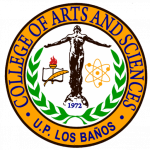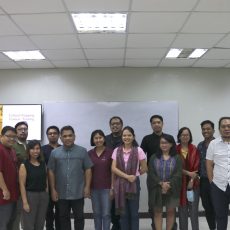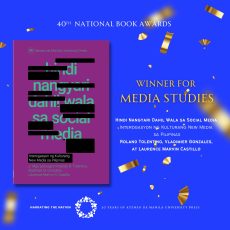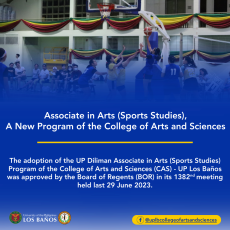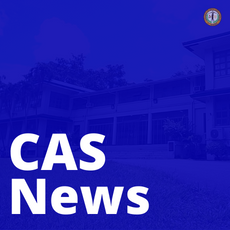
On the 26th of November, the UPLB Language Instruction Towards Excellence (LITE) Program held its second enLITEn Webinar featuring guest speaker, Assistant Professor Rogelio Panuelos, Jr. from the UPLB College of Arts and Sciences via Zoom and Facebook Live.
enLITEN aimed to discuss the ever-relevant topic of plagiarism and policing in academic writing through the lecture of Asst. Prof. Panuelos, which is full of insight and stories of his personal experience regarding plagiarism.
Dean Maribel L. Dionisio-Sese, Dean of the University of the Philippines Los Baños College of Arts and Sciences and the UPLB LITE Program’s manager, opened the program by expressing her gratitude to the members of the LITE program and the participants of the Webinar along with a brief retelling of the history and definition of plagiarism as well as advising caution of its effect on the value and integrity of research.
“Policing academic writing against plagiarism starts with us. We must be extra mindful of what we read and write,” said Dean Dionisio-Sese in her opening remarks as she talked about plagiarism in the 21st century, where she added:
“Policing ourselves to help cull plagiarism is a good start in protecting the worth of research in our society; however, we need to exert effort and look forward to the day that our institutions will have their respective office of research integrity that will safeguard the sanctity of scientific inquiry.”
After that warm welcome, the lecture held by Asst. Prof. Panuelos subsequently started. His lecture, titled “Beyond Singko and Stories of Shame: An Academic Chikahan” on Plagiarism and Policing in Academic Writing, was an insightful discussion of the complexity of plagiarism which he divided into four segments.
He first presented in the Webinar the different perspectives of plagiarism, from the traditional view to the more recent and critical viewpoint there is today. He used his stories about his time as a student in a writing class and of a fellow student who couldn’t graduate due to plagiarism to provide examples of the traditional perspective of plagiarism, where plagiarism is likened to a crime.
“Students are positioned to be potential criminals who need to be policed by teachers in the classroom,” said Asst. Prof. Panuelos.
He questioned at that time if that was really to be the case, where students were expected to know what they are supposed to do from the get-go. Stating that this perspective does not recognize accidental or unintentional plagiarism.
The second perspective, that he shared, turned the viewpoint from the student to the academic institutions where plagiarism is not a crime but a technical breach of established rules. He shared his experience in using honor codes in one of his classes. He added that it seemed that the teacher was constantly reminding him of the rules and the consequences of breaking them.
The third perspective revolves around citation and the threat of detection, saying that “a whole gotcha industry” (cited from Howard) came about. Discussing the various online applications that popped up in recent years whose services are about checking for plagiarism, he jokingly expressed that that would have been helpful in his time.
“We need to open up spaces for the discussions of plagiarism as a writing issue, not a moral issue, that can be addressed by learning and teaching writing and not by extreme punishments,” he added before moving to the final perspective.
The final perspective that he shared is the most recent and radical viewpoint of plagiarism. It was about encouraging us to be meaning makers in academic writing and join the conversation, expressing the need to shift our attention from punishment to teaching and learning.
After sharing the different perspectives, he talked about academic writing as social practice. Citing the Burkean Parlor, he attempted to appropriate the term and contextualize it in the Filipino culture by comparing it to a “Simpleng Handaan” before discussing the social model of academic writing. He stated that there are many different factors and aspects in academic writing than just the student and teacher.
The last segment of his talk involved him sharing some personal tips with the audience. He listed four strategies that he hoped would help: 1.) find the sources you need, 2.) converse with source authors, 3.) integrate sources to make new meaning, and lastly, 4.) allow sources to change your life.
He ended his lecture hoping that future talks would take place and add to the still ongoing discussions regarding plagiarism.
“How can we open more parlors and prepare simpleng handaans?” shared Asst. Prof. Panuelos at the end of his talk.
A short break was then conducted along with a catchy intermission number by the host speaker, allowing the viewers to stretch and relieve themselves for a few minutes. What came next was a lengthy Question and Answer portion facilitated by Asst. Prof. Jerard Eusebio in which Asst. Prof. Panuelos answered various questions submitted through the Zoom and Facebook live comments as well as giving additional tips and strategies that might help – all of which can be viewed at the UPLB LITE’s Facebook page.
After the fruitful Q&A session with Asst. Prof. Panuelos, the event came to a close with the Coordinator of the UPLB LITE Program, Asst. Prof. Kristine Adalla, giving thanks and imparting her closing message.
“We hoped that this Webinar sheds some light on how we should look at plagiarism, and how we can teach our students the basic ways on how to avoid it; and as educators, how we should approach this issue to our students and even among ourselves as we are writers too,” said Asst. Prof. Adalla. “And we also hope that this Webinar helped you gain more confidence in writing, and as writers, let’s not take too long in the parlor and instead let’s move forward to what’s essential to our study,” she finished, marking the end of the second enLITEn Webinar.
— EJ Azares
